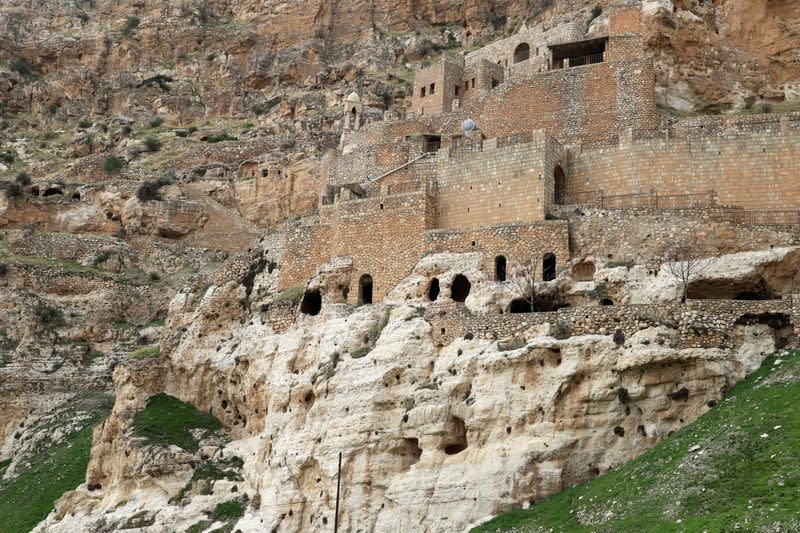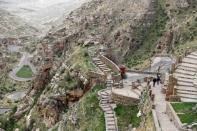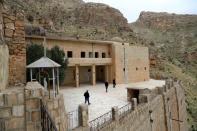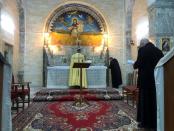An ancient monastery in Iraq is a symbol of Christian survival
By John Davison
ALQOSH, Iraq (Reuters) - Nestled in a steep rocky hillside among the remote mountains of northern Iraq, the Rabban Hormizd Monastery has watched invaders come and go through Christianity's tumultuous history in this corner of ancient Mesopotamia.
Mongols, Persians, Arabs, Kurds and Ottomans have sacked, surrounded or occupied the seventh century monastery and the Christian town of Alqosh, above which it perches, near the borders with Turkey, Syria and Iran.
But Christians there survived the latest onslaught, this time by Islamic State militants who took over one third of Iraq between 2014 and 2017, including the city of Mosul just 20 miles (32 km) to the south.
Mercifully for them, a string of villages just above Mosul was as far north as the group got, sparing Alqosh the brutality inflicted on minority faiths and sects. Some families fled those villages to the safety of the town.
"This will remain a Christian town, I believe. We have to stay in this land," said Brother Saad Yohanna, an Iraqi monk working at a local orphanage.
"Far fewer people live here these days - maybe 1,000 families from 3,000 a few years ago, but it remains home for them."
Residents and local Christians regularly make the winding hike up to the monastery to pray or seek solace.
For them, the town, its monasteries and churches are a sanctuary for life and worship in a country where they say Christian existence is threatened.
Of the 1.5 million Christians in Iraq before the U.S. invasion in 2003, only around a fifth remain, the others driven out by sectarian violence first by al Qaeda and then Islamic State.
The displaced who remain will get rare recognition this week, as Pope Francis visits the country from March 5-8. The closest he will get to Alqosh is a cluster of demolished churches in Mosul, once Islamic State's de facto capital.
SYMBOL OF ENDURANCE
Yohanna was among those who left Alqosh when Islamic State took Mosul and several Christian-inhabited towns to the south. He returned two weeks later as Alqosh emerged unscathed.
Some families from surrounding areas made the town their permanent home. Their villages are now under the control of Shi'ite Muslim militias who helped the Iraqi army defeat Islamic State in 2017.
"People opened their doors to us as fellow Christians fleeing Daesh, and helped us to get our lives back together," said Maysun Habib, a mother of seven from the nearby Tel Keyf area. Daesh is an Arabic acronym for Islamic State.
"Alqosh is protected, it's not exposed or controlled by militia," she added.
Control of Alqosh itself, after centuries of change, remains unresolved. It lies along disputed territory between the Baghdad central government and the self-run Kurdistan region.
It is in Baghdad's Nineveh province, but controlled by Kurdish forces who helped drive Islamic State away.
Habib's family is among some 100 from nearby areas who now worship in Alqosh's churches, and occasionally at a chapel that remains usable at the monastery.
They see the mountainside retreat as a rare symbol of Christian endurance, spared the desecration wrought by Islamic State in other parts of northern Iraq.
The country's oldest monastery of St Elijah, near Mosul, was damaged during the 2003 conflict before Islamic State destroyed it just over a decade later.
Rabban Hormizd Monastery, named after its founder, was built when Muslim armies were conquering the Middle East, and fortified over time. Dotted around its high brick walls are caves where monks once cloistered and prayed.
It became an important centre of the Eastern Catholic clergy from the 16th to 19th century, although monks gradually moved out to more accessible digs, including a second monastery in the town.
It is open now to visitors, worshippers and local monks, but not inhabited.
Shatha Tawfiq, a woman who moved to Alqosh, summed up the mood among local Christians ahead of the first ever papal visit to Iraq.
"Our situation in Iraq is not good, but I feel at home here."
(Additional reporting by Kawa Omar in Alqosh; Editing by Mike Collett-White)

 Yahoo Finance
Yahoo Finance 









